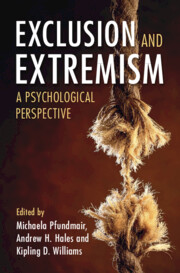Introduction
Published online by Cambridge University Press: 16 May 2024
Summary
Extremism has recently been described as one of the most pressing problems in contemporary society (Litter & Lee, 2023). The burst of extremism in today’s world has happened as the hodgepodge of different ideologies replaced the hegemonic ideological blocks of the Cold War (Ugarriza, 2009) and the rise of digital technologies catalyzed this change (Litter & Lee, 2020). In order to propose policies or interventions to reduce or eliminate extremism, it is necessary to understand its causes. What is clear is that extremism results from a multitude of causes, not just one. In this volume, we will focus on one specific contributor which has received relatively little attention in the past: social exclusion.
Information
- Type
- Chapter
- Information
- Exclusion and ExtremismA Psychological Perspective, pp. 1 - 4Publisher: Cambridge University PressPrint publication year: 2024
